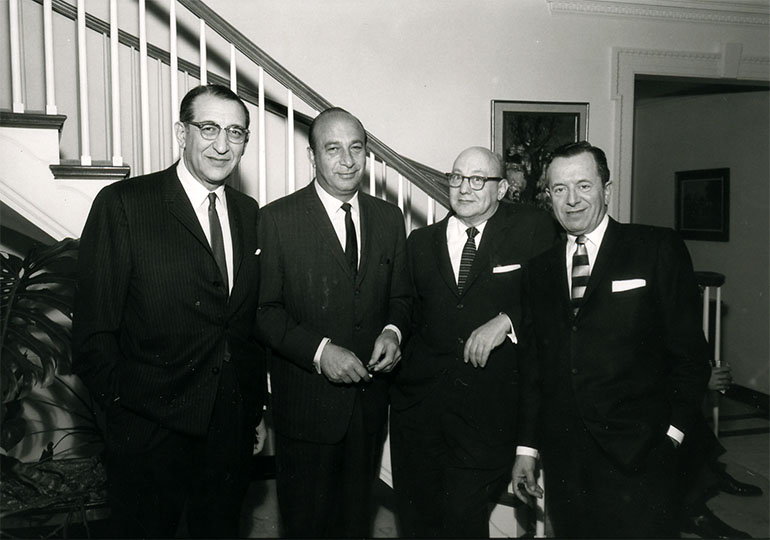Max M. Fisher, Paul Zuckerman, Leonard N. Simons, Louis Berry
“I take the things I do seriously, but I do not take myself seriously.”
– Leonard N. Simons
It’s no surprise that it takes the words of Leonard N. Simons himself to aptly describe the man. Simons was a wordsmith and an ad man, witty and entertaining. He could tell a captivating story while simultaneously asking for a donation to a worthy cause. Because even as Simons could make you laugh, he could also make you understand the importance of Tzedakah. Or, as he called it, the “Essence of Judaism.”

While you may not have known Leonard N. Simons, who passed away in 1995, you have probably heard the name. The Leonard N. Simons Jewish Community Archives. Leonard N. Simons Building (Wayne State University). Leonard N. Simons History-Maker Award (Jewish Historical Society of Michigan). Leonard N. Simons Rare Book Collection (Temple Beth El). The list could go on, representing the medley of causes and organizations near and dear to Simons. Instead, let’s look at the man behind the name.
Leonard Norman Simons was born on July 24, 1904 (he would have celebrated 120 years this month!). His biographical information is easy to find, from his childhood in Detroit to his many years as an advertising executive at Simons-Michaelson-Zieve to his philanthropic work.
But it was the wisdom shared by his grandfather on the occasion of Simons’s Bar Mitzvah that truly shaped his life. “Love, respect and generosity are the three most important words in the dictionary. If you have certain talents that permit you some day to make a lot of money, then remember this…a shroud has no pockets.”
This philosophy drove Simons to become a macher – a doer. He was a man of action, someone who got things done. Buildings across Detroit stand because of Simons. Cancer research has moved forward because of Simons. Rare books sit in libraries rather than landfills because of Simons. History is preserved for future generations because of Simons. The Jewish community and the greater Detroit community have benefited immeasurably because of Simons. And while there are many tributes that honor the memory of Simons, they cannot fully express his impact on the world. But perhaps this story will.
Around 1960, Simons looked up the word “Moses” in a dictionary published by Oxford University Press and was dismayed to discover that the only definition was ‘nickname of a Jewish money lender’.” He then looked up “Jew” and discovered more derogatory language. This led him to a dozen other dictionaries, all but one using similar, offensive definitions. Macher that he was, Simons didn’t get upset, he got to work, contacting the American Jewish Committee and Ant-Defamation League of B’nai B’rith to see what could be done.
After much work, some of the publications, including Oxford University Press, agreed to eliminate some of the offending language. But they also insisted on keeping some, instead adding “vulg” (meaning vulgar) to the meaning.
Publishers viewed the issue as a matter of lexicography. Simons saw it as a tool to form and change people’s minds. When this story was picked up by the Detroit News and Jewish Telegraphic Agency, the outcry helped elicit changes in some volumes, a partial victory in the eyes of Simons.
This author thinks Simons would be pleased to know that a dictionary search in June 2024 found much of the pejorative language removed. And where it isn’t, it is named for what it is – an anti-Semitic stereotype. So not only has our community been shaped by the work of Leonard Simons, so has our vocabulary. But that shouldn’t come as a surprise; words were always his most powerful tool.

